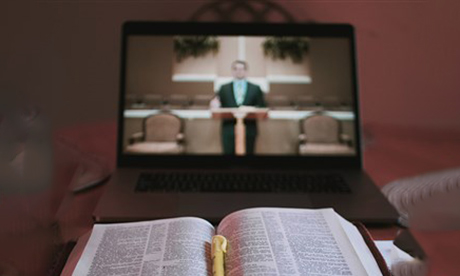A “deep-seated dissatisfaction” with online worship during the Covid-19 pandemic has been identified by new research published this week.
In a year-long joint project by the University of Chester and Manchester Metropolitan University, researchers held focus groups with hundreds of members of the public and clergy about their perceptions of religious life during COVID-19.
“Rituals – regular weekly worship, funerals, baptisms, festival celebrations, and the like — have been exceptionally difficult for most participants and leaders during the pandemic,” Dr Josh Edelman, Reader at Manchester Metropolitan and lead researcher, said.
“During this crisis, people have found meaning, stability and community in participating in the rituals of their faith.”
“Digital technologies have made that possible, even during social distancing, and that’s been a great benefit. But the experience of worshipping online is different than the experience of worshipping in person. While there have been some very exciting developments, the sense of community that comes from face-to-face gathering is hard to beat,” Edelman continued.
“We hope this project will help religious leaders think through the possibilities and challenges of digital technology, so that when they’re used, it’s in a helpful, humane way that broadens out and opens up religious life, rather than shutting it down.”
Researchers conducted their study in three parts: a survey of 604 religious leaders and congregants; an action research group to respond to the findings comprised of clergy and lay leaders from various faith communities; and 15 case studies with different religious groups, including:
- Birmingham Mosque
- Catholic churches
- Orthodox Jewish online women’s prayer group
- Specific events such as Remembrance Sunday
- Clergy and lay leaders from various faith communities.
The report notes that there is “a tremendous appetite for religious ritual online”, and that online services are “particularly inviting for those who are seeking out new communities, experiences, and modes of worship”.
It observes: “While the disembodied nature of online practice could make some rituals feel distant or inauthentic, the ability of worshippers to join communities far from their homes has nevertheless been perceived as a significant positive development that is likely to continue.
This is especially for people with disabilities, for those who do not have a local congregation that serves their religious needs, or for members of faiths whose numbers in the UK are relatively small.”
Alana Vincent, Professor of Jewish Philosophy, Religion and Imagination at the University of Chester and researcher on the project, said: “The pandemic has accelerated a move towards digitisation which was already highly likely – but it has also made people more aware of what cannot be digitised.”
“The challenge for religious communities going forward will be to maintain the good things, such as increased accessibility, while also providing the sense of community and connection that people crave,” Vincent concluded.




